The Saturday Read: White smoke
Inside: Pope Leo XIV, Jeremy Bowen on Gaza’s future, Jason Cowley on Rafael Nadal, John Gray and the return of Edward St Aubyn.
Good morning. Welcome to the Saturday Read, the best of the New Statesman, in print and online this week. This is Finn with Nicholas and George.
Over at the NS office in Farringdon, London, we had a rolling live stream of the slightly unspectacular chimney in the Vatican, watching patiently for the feted white smoke. Well, just after 5pm on Thursday evening and there it was! But an hour later the real news landed – he’s American?! Cardinal Robert Prevost, born in Chicago in 1955, and now Pope Leo XIV, is the first of his kind.
An American pope is a jarring idea. But did you know there was once an English iteration? Nicholas Breakspear from Hertfordshire became Pope Adrian and took over the Holy See in 1154, until his death just five years later. He was the only pope born in an English-speaking country until Leo XIV prevailed at conclave this week. A somewhat delayed victory for the anglosphere.
Donald Trump was quick to declare the American papacy “a great honour”. But some are wondering whether Prevost’s elevation is part of a broader backlash to the Trump administration. The new pope is an Augustine expected to further Francis’s liberalising reformation. Meanwhile, Trump loyalist Steve Bannon predicted that there's “definitely going to be friction” between Leo and the president.
But Catholicism as an institution long predates the culture wars of the 21st century. And the left-right binary, while we’re here. So – as I warned on the death of Francis – we mustn’t over-index the politics of the appointment. Instead we should remember that Prevost and the cardinals who elected him are men guided by faith and doctrine before anything else. I suppose in that way, Leo and Trump couldn’t be more different.
As ever, thanks for reading and have a great weekend.
1—“Marches into a second century”
Jeremy Bowen – the BBC’s international editor – writes the cover story this week on Gaza. In 1993 the Israelis and Palestinians believed they found a way to end a century of conflict, he writes. But by 7 October 2023 any hopes for lasting peace were long gone. FMcR
Nothing in all the generations of the conflict between Jews and Arabs comes close in horror to 7 October and in the 19 months since. New depths of dehumanisation, on both sides, cast a deep shadow over the future. In the 1990s enough Palestinians were prepared to trust Arafat and enough Israelis trusted Rabin to open a small window when peace might just have worked, with luck and if both sides had been more determined to give up cherished dreams and beliefs. The window closed and now is buried deep in the past.
2—“The liberal’s conservative”
Freddie is in Connecticut this week to meet Ross Douthat – the “most famous conservative columnist in the world.” Douthat is also a Catholic, and so Freddie asks: what explains all the Catholicism in Maga? FMcR
What explains Maga’s Catholic tinge? JD Vance converted in 2019 and his politics is drawn in stark religious lines. Kevin Roberts, the executive of the Heritage Foundation, which authored the Project 2025 blueprint for Trump’s second term, is also Catholic. “It’s the last strong institutional form of Christianity that still seems to take its own claims seriously, and has the kind of intellectual heft and firepower that people educated at places like Harvard and Yale or Oxford and Cambridge want. If you’re going to be a Christian in the intelligentsia, it feels like Catholicism or nothing.”
3—“Kingdom of clay”
Tragically, the office didn’t go with my headline (“Feet of clay”). But otherwise Jason’s review of a new biography of Rafael Nadal is a lovely tribute to a sportsman who declined with dignity. NH
There’s something especially poignant about the last days of a tennis champion. The technical brilliance, discipline and will to win remain but the body is much less accommodating. In the end, no matter what you have achieved, as Geoff Dyer writes in The Last Days of Roger Federer, “you run out of options”. The question, then, is how and when to depart.
4—“World-class chef working while drunk”
Show me a lettered lad in London, and I’ll show you an Edward St Aubyn reader. And so, Nick has reviewed the new book from the English-language novel’s quietly regnant champion. It didn’t quite land, he says. GM
The great achievement of Edward St Aubyn’s literary career is to have brokered a merger between two vast, international and mutually hostile enterprises, the English comic novel and the more continental tradition of psychological realism. This might have been a doomed venture, involving the acquaintance of two largely incompatible balance sheets: the English offering of alliteratively named side-characters, wearisome verbal gags and frothy plot contortions, compelled to rub up against steppe-borne existentialists, conscience-wracked breakdowns and appeals to the Almighty. One imagines a beaming PG Wodehouse shaking the skeletal hand of Fyodor Dostoevsky, or Kingsley Amis belching with laughter in the unstirring face of Samuel Beckett.
To enjoy our latest analysis of politics, news and events, in addition to world-class literary and cultural reviews, click here to subscribe to the New Statesman. You'll enjoy all of the New Statesman's online content, ad-free podcasts and invitations to NS events.
5—“The allure of evil”
Proust was a great European “voyeur”, but he mostly kept to pleasure and infatuation. Curzio Malaparte was obsessed with destruction and violence. John Gray discusses the career of the latter, fascism’s foremost chronicler. GM
Why read Malaparte today? The answer cannot be only for the unnerving brilliance of his postmodern prose. A cruel and perverse nature enabled him to access an ugly truth. A propensity for inhuman violence is integral to European civilisation. He rightly dismissed the notion that totalitarianism originated outside of the West – Russian communism in “oriental despotism”, for example. Twentieth-century fascism, Nazism and communism were all quintessentially European projects. The impulse to remake the world on a new model, often seen as a mark of the superiority of the West, is the source of its passion for mass killing.
6—“Maybe half-belief is better than nothing”
A new book by Lamorna Ash explores the wave of Christian rediscovery sweeping today’s youth. Pippa reviews the book and scrutinises the phenomena, applying with the full force her theological nous. GM
I, too, have wondered at the potential for manipulation in the heightened emotion of worship; at the possibility that words from God are really just words from humans. I have longed for exegesis in sermons full of tenuous analogies. I have sat in discussion groups on courses like Christianity Explored and bridled as Ash does – only I attended as a “facilitator”, one of those leading the group. I found a sort of dishonesty in these spaces, supposedly designed for exploration. They ask questions in the way a teacher who already has the answer in mind does: “That’s a good thought, but it’s not the one I’m looking for…”
7—“Funny-funny”
I have been reading Leo Robson’s literary criticism in the New Statesman for as long as I have been reading the New Statesman. It is therefore an occasion of both personal and institutional inspiration to see him graduate from critic to novelist with his debut, The Boys. Our critic, Alex Clark, has a simple assessment: “I enjoyed it immensely.” NH
Robson assembles ingredients both familiar and recherché: a highly specific setting, Swiss Cottage, and a striking moment, the 2012 London Olympics; a labyrinthine family-and-friends backstory playing out over the course of a randomly eventful summer; characters with a wildly developed facility for aphoristic conversation; mild romantic and sexual peril; parties you would sooner eat your own leg than attend.
8—“Red, gold, finery – and all that”
The most striking thing about Pope Leo XIV’s first appearance was not what he said but what he wore. Is religious maximalism – embraced by Benedict XVI but abandoned by Francis – back in fashion? What does that tell us beyond the vestments? I wrote about Leo’s first impressions. FMcR
But there seemed to be equal appetite for a papacy that furthered the happier parts of Francis’s legacy: his modernising lilt, his ability to reach out to those in the margins, his concern for the poor. Cardinal Robert Prevost – now Pope Leo XIV – was touted as the man who could do both, who could bridge the ideological gap, who could be a continuity and a change candidate at the same time. His clothes and speech made exactly that case: I look like Benedict, I sound like Francis.
George’s Best of the Rest
Saunders & Wuthnow: Xi can’t trust his military
James Marriott: Triggernometry vs Guilty Feminist – both sides lose
James D Walsh: Everyone is cheating their way through college
Lena Dunham: Why I broke up with New York
Chris Murphy: Hawk Tuah girl returns
Lily Isaacs: The climax of Addison Rae
And with that…
Journalist trading tips should often be avoided: the amount of phoney gossip and empty bluster I’ve picked up in a relatively short career would already fill the phonebook. But one conversation that was always going to be worthwhile was between Tina Brown, former editor of the New Yorker and NS alum, and Jeffrey Goldberg, editor of The Atlantic. The pair are the brains behind two of the most successful magazines of their respective eras, and were brought together as part of the “Truth Tellers” conference, organised to honour Fleet Street legend Sir Harold Evans.
In an age when British and American elites intermingle less than they used to, Brown might be the last person to have a genuine mid-Atlantic accent. There’s Berkshire and Oxford there, but she says “straddagy” for “strategy”, and “wide house” for “White House”. Her and Goldberg’s advice to fellow journalists struggling in the digital age was very plain: be interesting, make it interesting, and the readers will come. An eternal journalistic injunction.
The New Statesman is home to the finest writing on politics, culture and ideas. To stay up to date, subscribe using the link above.
— Finn, Nicholas and George.


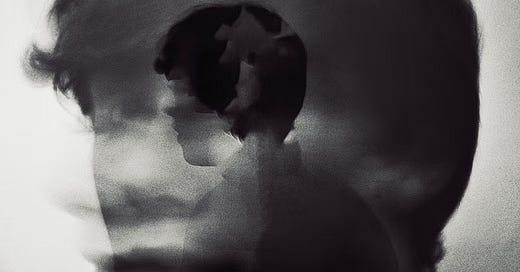


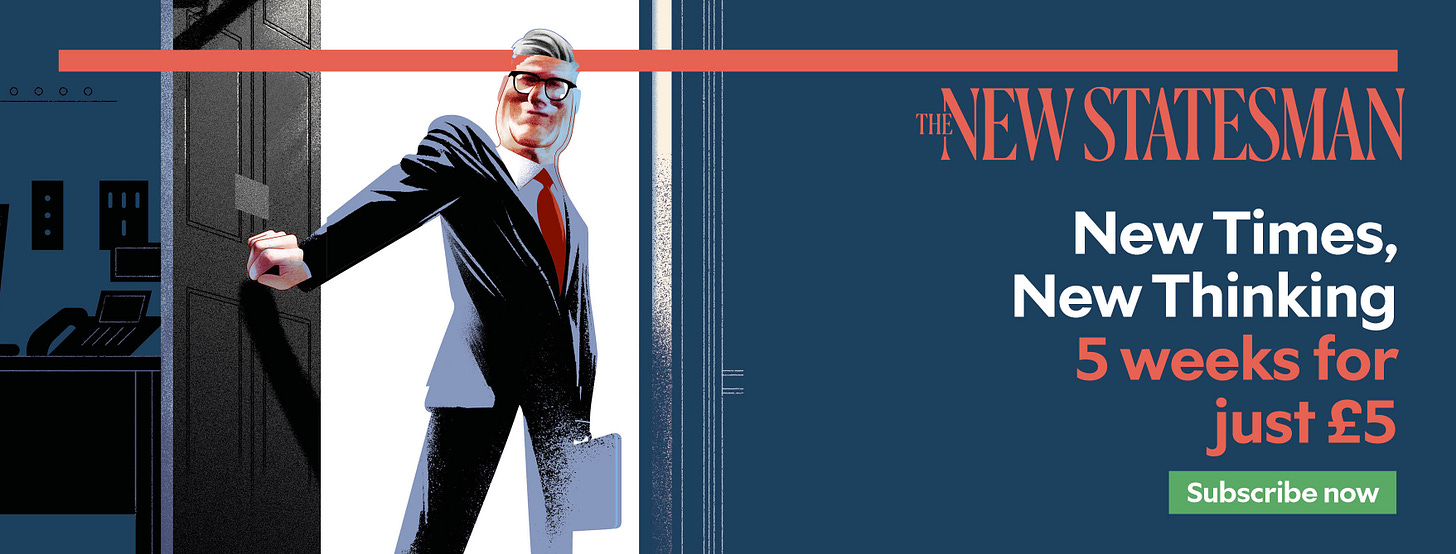
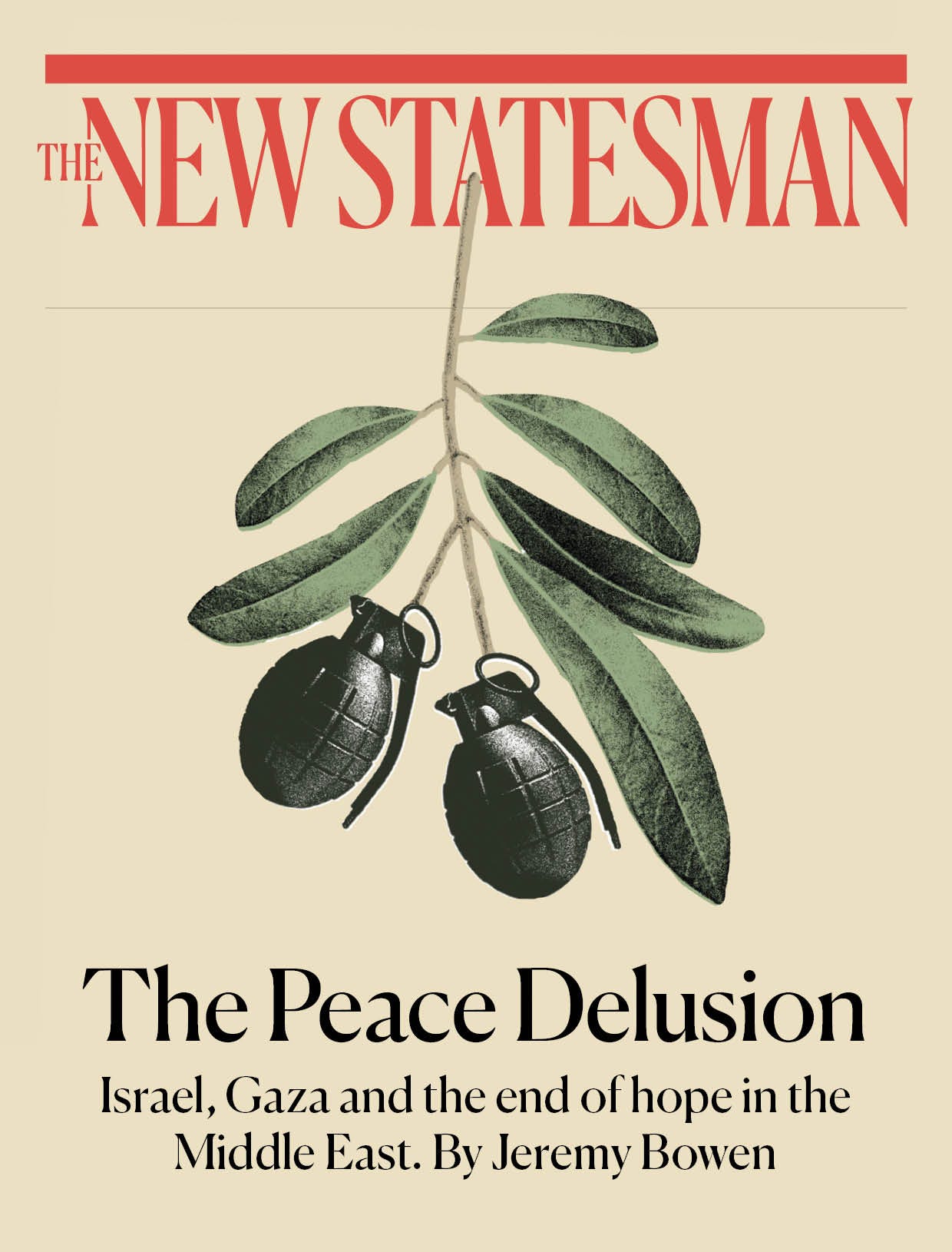
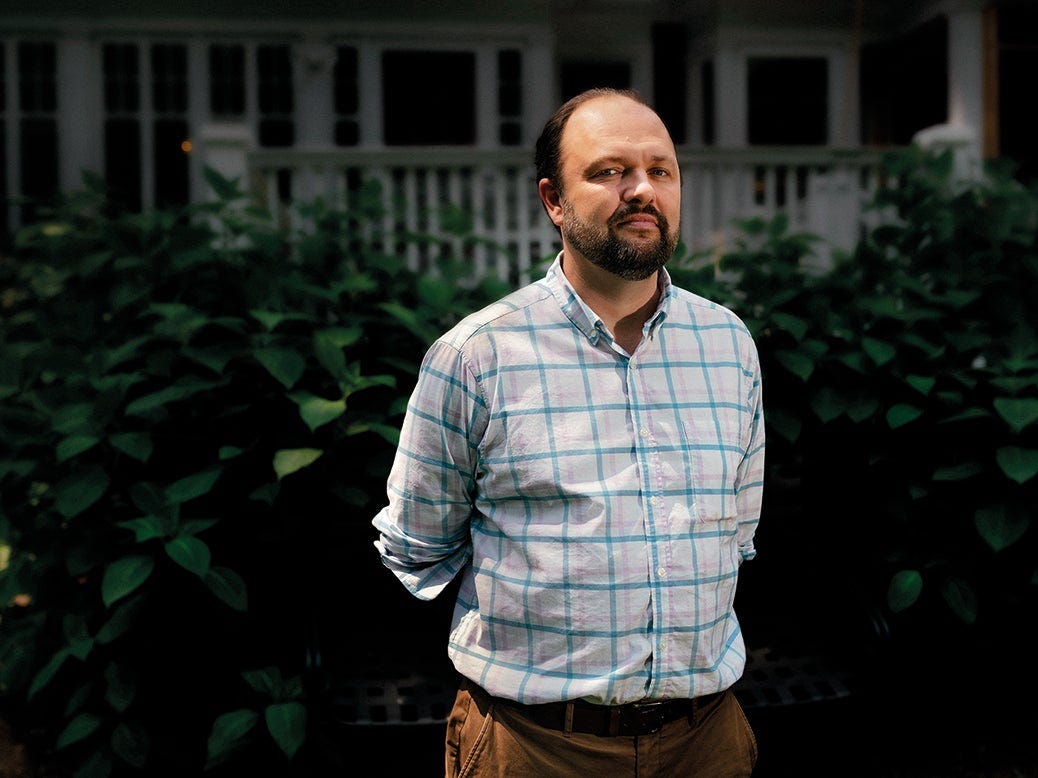

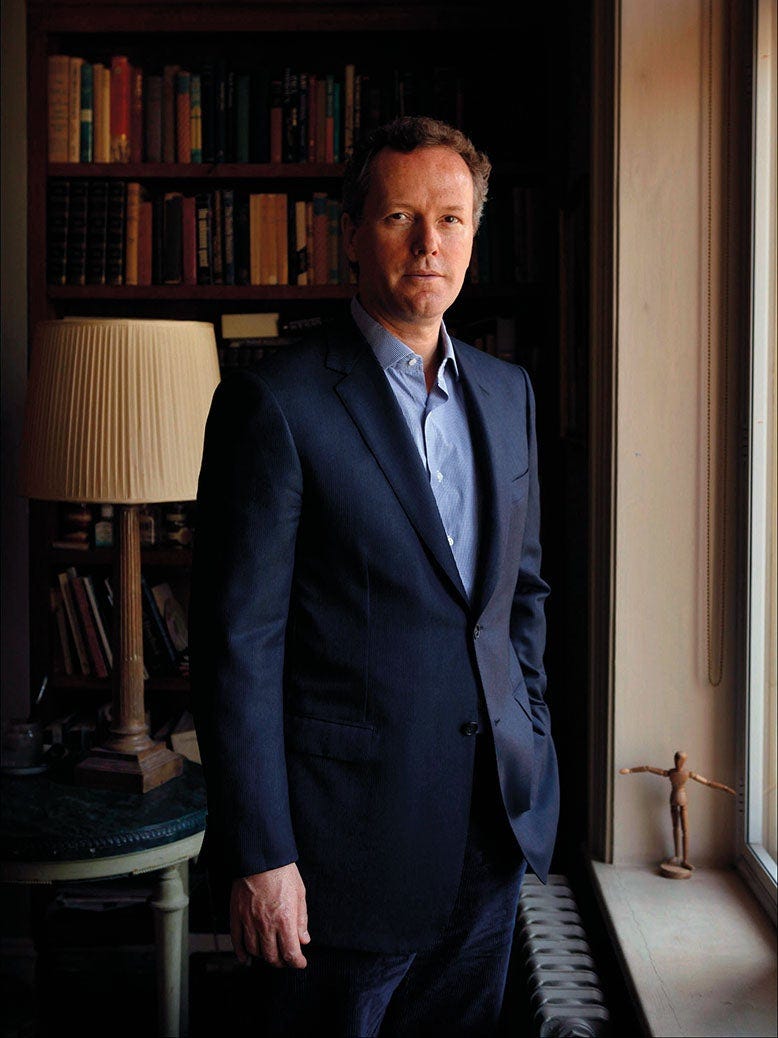
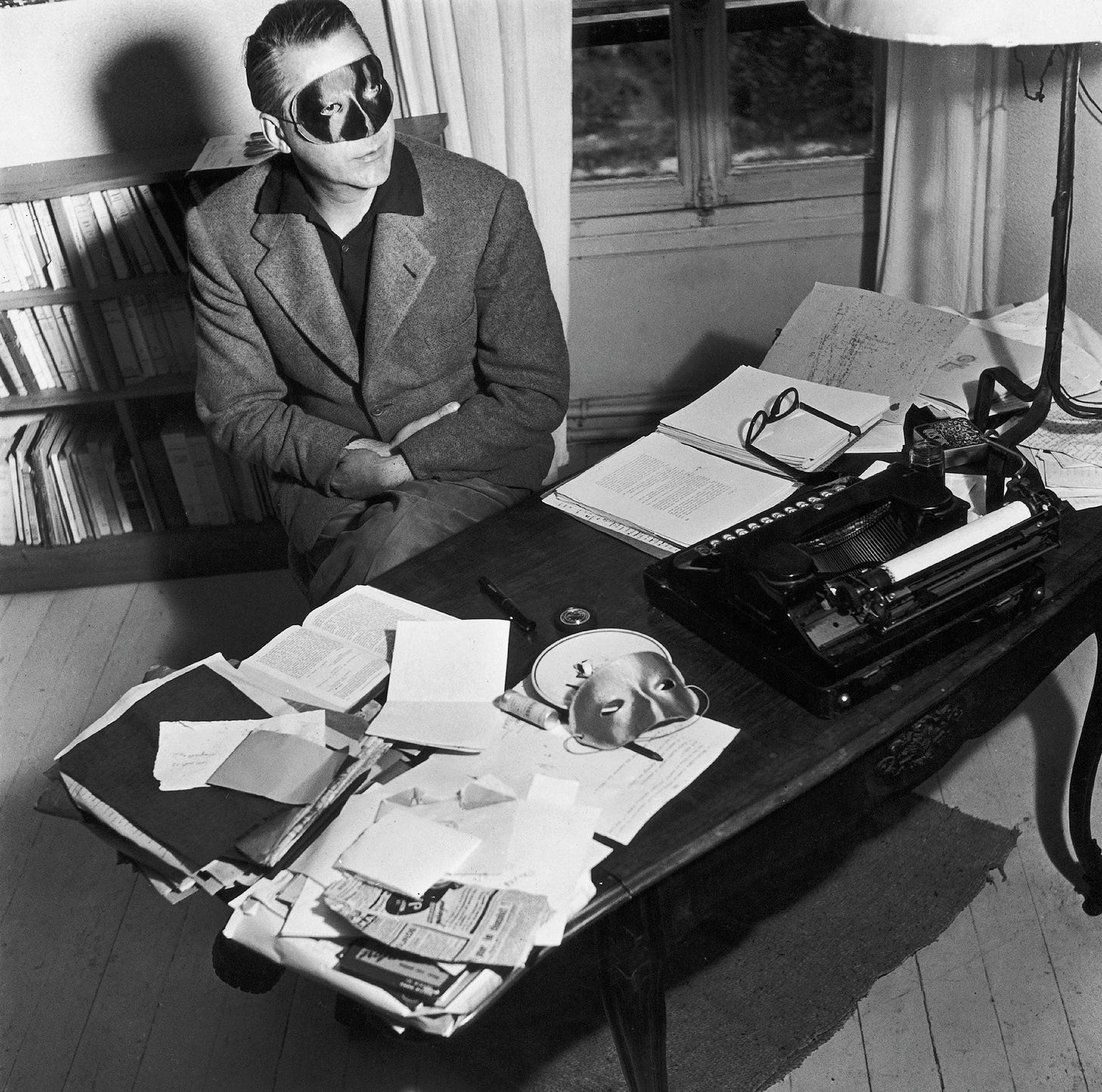


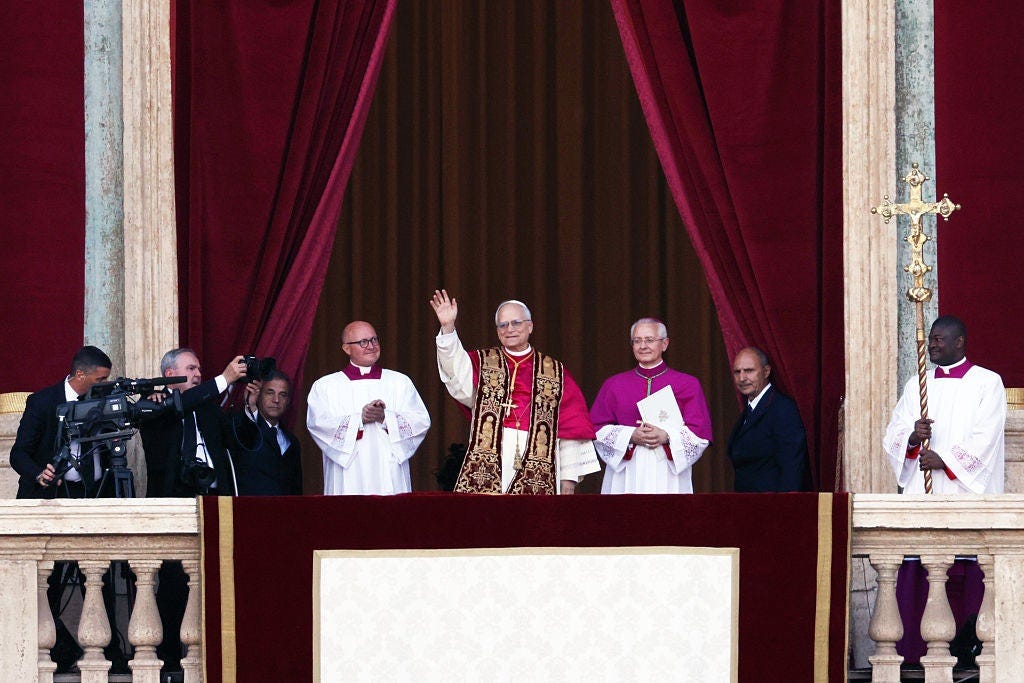

Perhaps the attraction of the US Right to Catholicism is that the Catholic Church is almost the only’ western’ institution where all the thinking and decision making is done by men (assuming that Iran and Afghanistan are not included). That reflects their comments about what Yale, Oxford and other universities ‘used to be’ - before they were taken over by people who couldn’t be confused with CS Lewis and JRR Tolkien (US versions are available). Plus they get to dress up without anyone saying they are the KkK.
Here’s another posit.
JD Vance has an audience with pope Francis. Two days later the latter passes.
New pope is… Murican.
States Francis chose him, yet dresses in full papal decorum.
Strings pulled…?
Oh my, the implications that would bring in its sillage…
Somehow tis all reminds me of Starwars (the film)…
Now what is this here pen implying, or is it merely inferring…?
Blasphemous thoughts?
Really?
Reality often surpasses fiction…
Ye canna really be thinking that,.. Nah.
Or can ye…
Am i the only one?
Ye tell me… (3 little dots)